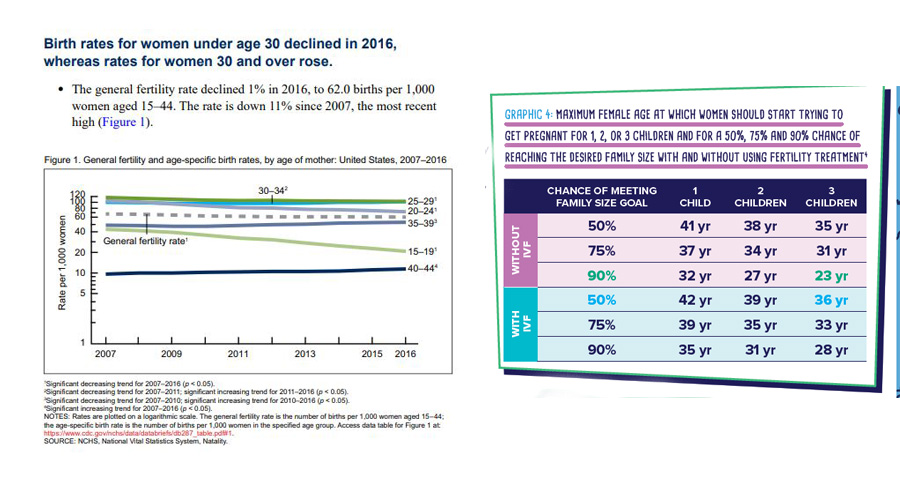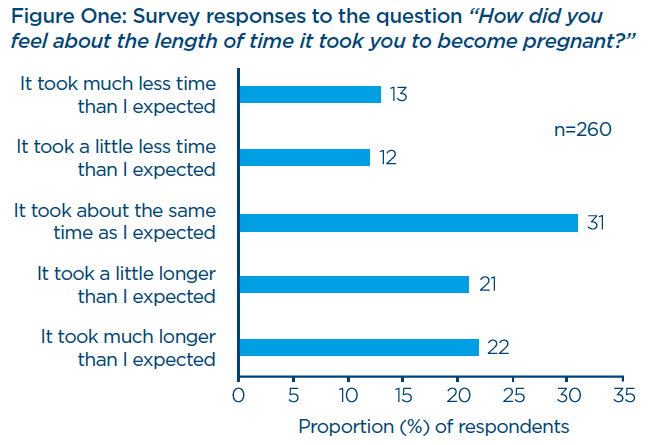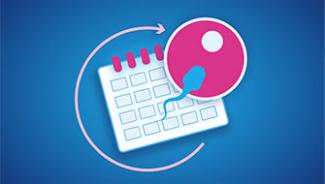Getting pregnant may take longer than you think

At the 2019 American College of Gynecology's annual meeting in Nashville, Clearblue® with Professor Michael Zinaman talked about women’s understanding of fertility and how American women feel about trying to get pregnant1.
Ok, I’m ready to get pregnant… now!
For the first time in human history there are more women in their 30s having babies than those in their 20s.
Many are choosing to wait longer to become mothers2 - until a time when raising children fits with career and life goals3,4, - so there is an expectation that when you start trying for a baby, it will happen quickly. The reality is that if you want a family of two or more children to be 90% sure of achieving your goal you need to start trying for your first well before your 30th birthday5:

How do you feel about trying to conceive?
We asked 1000 of you, with an average age of 33 years about your fertility6. Here’s what you told us…
74% said “I want to maximize my chances of getting pregnant as soon as possible,” while the rest said they’d prefer to let nature take its course. When it comes to planning their pregnancy, women from different countries have different attitudes, with women from the US especially wanting to maximize their chances of conception.
How long do you think it will take to get pregnant?
Younger women aged 20–24 years, are more optimistic about how long it takes to get pregnant than older women. This younger group believes it takes around 4 and a half months to conceive, when compared to those aged over 35 years, who think it takes nearly 6 months on average.
When thinking about a recent planned pregnancy, we asked how you felt about the amount of time it took to get pregnant: 43% said that it took longer than you expected, and you became worried about not being pregnant after an average of 5.9 months – 27% felt the same after the first 3 months.

Why does this research matter to you?
Women don’t know the reality of just how long it takes to get pregnant. Many expect to get pregnant as soon as they start trying, but if you’re under 35 and in good health, it is said to be perfectly natural for it to take up to a year.
It takes longer if you are older. For example, for women aged 38, 75% of those who have regular unprotected sexual intercourse will get pregnant within three years of trying.7
Just over a third of healthy couples will conceive in the first month of trying8. But it’s also true that approximately one in seven couples will also have difficulty conceiving.9
And that’s not all the survey found, the research also showed that many women don’t understand their cycles. What is especially worrying is a large number of US women believe that pregnancy is possible following intercourse on any day of the cycle.
Declaration of interest
This study was funded by SPD Swiss Precision Diagnostics GmbH, the manufacturers of Clearblue™ pregnancy and ovulation tests. Professor Michael J. Zinaman, MD FACOG FACS, Professor of Obstetrics and Gynecology, Albert Einstein College of Medicine.is an advisory board member for SPD Development Company Ltd.

Looking for insights on your health journey? Clearblue® sends you curated, science-backed articles right to your inbox.
- Zinaman, M.J., Johnson, S., Foster, L., Zanzi, G. and Mollard, C., 2019. Fertility Knowledge of Women in the United States [6M]. Obstetrics & Gynecology, 133, p.141S.
- Martin, J.A., Hamilton, B.E. and Osterman, M.J.K., 2016. Births in the United States, 2015. NCHS data brief, no 258. National Center for Health Statistics: Hyattsville, MD.
- Mills, M., Rindfuss, R.R., McDonald, P. and Te Velde, E., 2011. Why do people postpone parenthood? Reasons and social policy incentives. Human reproduction update, 17(6), pp.848-860.
- Prior, Eugenie, et al. "Fertility facts, figures and future plans: an online survey of university students." Human Fertility(2018): 1-8.
- Habbema, J.D.F., Eijkemans, M.J., Leridon, H. and te Velde, E.R., 2015. Realizing a desired family size: when should couples start?. Human Reproduction, 30(9), pp.2215-2221.
- Zinaman, M.J., Johnson, S., Foster, L., Zanzi, G. and Mollard, C., 2019. Fertility Knowledge of Women in the United States [6M]. Obstetrics & Gynecology, 133, p.141S.
- National Collaborating Centre for Women's and Children's Health (UK, 2004. Fertility: assessment and treatment for people with fertility problems. RCOG press.
- Gnoth, C., Godehardt, D., Godehardt, E., Frank‐Herrmann, P. and Freundl, G., 2003. Time to pregnancy: results of the German prospective study and impact on the management of infertility. Human reproduction, 18(9), pp.1959-1966.
- National Collaborating Centre for Women's and Children's Health (UK, 2004. Fertility: assessment and treatment for people with fertility problems. RCOG press.

When is the best time to get pregnant?
There are only a few days each cycle, around ovulation, when a woman is fertile. Knowing these days can maximise your chance of conceiving.




